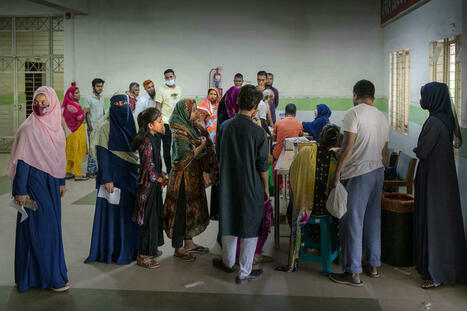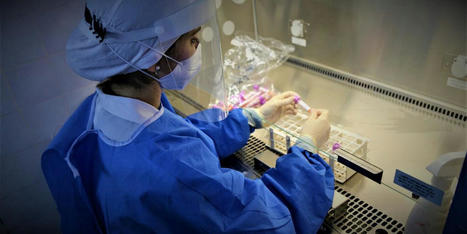January 26, 2021 - The WHO Strategic Advisory Group of Experts (SAGE) on Immunization has issued Interim recommendations for use of the Moderna mRNA-1273 vaccine against COVID-19 in people aged 18 years and older. Here is what you need to know.Here is what you need to know.
Who should be vaccinated first?
As with all COVID-19 vaccines, health workers at high risk of exposure and older people should be prioritized for vaccination. As more vaccine becomes available, additional priority groups should be vaccinated, with attention to people disproportionately affected by COVID-19 or who face health inequities.
Who else can take the vaccine?
The vaccine is safe and effective in people with known medical conditions associated with increased risk of severe disease, such as hypertension, diabetes, asthma, pulmonary, liver or kidney disease, as well as chronic infections that are stable and controlled. Although further studies are required for immunocompromised persons, people in this category who are part of a group recommended for vaccination may be vaccinated after receiving information and counselling.
Persons living with HIV are at higher risk of severe COVID-19 disease. Known HIV-positive vaccine recipients should be provided with information and counselling. Vaccination can be offered to people who have had COVID-19 in the past. But individuals may wish to defer their own COVID-19 vaccination for up to six months from the time of SARS-CoV-2 infection. The vaccine can be offered to a breastfeeding woman who is part of a group recommended for vaccination (e.g. health workers); discontinuing breastfeeding after vaccination is currently not recommended.
Who should not take the vaccine?
While pregnancy puts women at a higher risk of severe COVID-19, the use of this vaccine in pregnant women is currently not recommended, unless they are at risk of high exposure (e.g. health workers). Individuals with a history of severe allergic reaction to any component of the vaccine should not take this or any other mRNA vaccine. While vaccination is recommended for older persons due to the high risk of severe COVID-19 and death, very frail older persons with an anticipated life expectancy of less than 3 months should be individually assessed. The vaccine should not be administered to persons younger than 18 years of age pending the results of further studies.
What’s the recommended dosage?
SAGE recommends the use of the Moderna mRNA-1273 vaccine at a schedule of two doses (100 µg, 0.5 ml each) 28 days apart. If necessary, the interval between the doses may be extended to 42 days. Compliance with the full schedule is recommended and the same product should be used for both doses.
Is it safe?
While this vaccine has yet to be approved by WHO for an Emergency Use Listing, it has undergone review by the European Medical Agency (EMA) and consequently meets WHO’s criteria for SAGE consideration. The EMA has thoroughly assessed the data on the quality, safety and efficacy of the Moderna COVID-19 vaccine and authorized its use across the European Union.
SAGE recommends that all vaccinees be observed for at least 15 minutes after vaccination. Those who experience an immediate severe allergic reaction to the first dose should not receive additional doses. Longer-term safety assessment involves continued follow up of clinical trial participants, as well as specific studies and continued surveillance of secondary effects or adverse events of those being vaccinated in the roll out. The Global Advisory Committee on Vaccine Safety, a group of experts that provides independent and authoritative guidance to the WHO on the topic of safe vaccine use, receives and assesses reports of suspected safety events of potentially international impact.
How efficacious is the vaccine?
The Moderna vaccine has been shown to have an efficacy of approximately 92 per cent in protecting against COVID-19, starting 14 days after the first dose.
Does it work against new variants?
Based on the evidence so far, the new variants of SARS-CoV-2, including the B.1.1.7 and the 501Y.V2, do not alter the effectiveness of the Moderna mRNA vaccine. The monitoring, collection and analysis of data on new variants and their impact on the effectiveness of COVID-19 diagnostics, treatments and vaccines continues.
Does it prevent infection and transmission?
We do not know whether the vaccine will prevent infection and protect against onward transmission. Immunity persists for several months, but the full duration is not yet known. These important questions are being studied. In the meantime, we must maintain public health measures that work: masking, physical distancing, handwashing, respiratory and cough hygiene, avoiding crowds, and ensuring good ventilation.



 Your new post is loading...
Your new post is loading...









